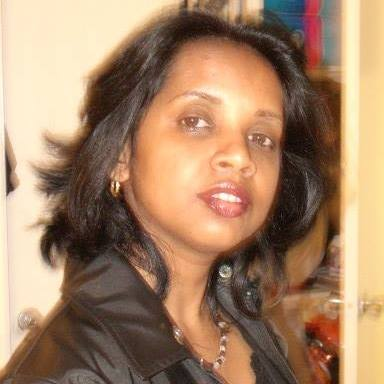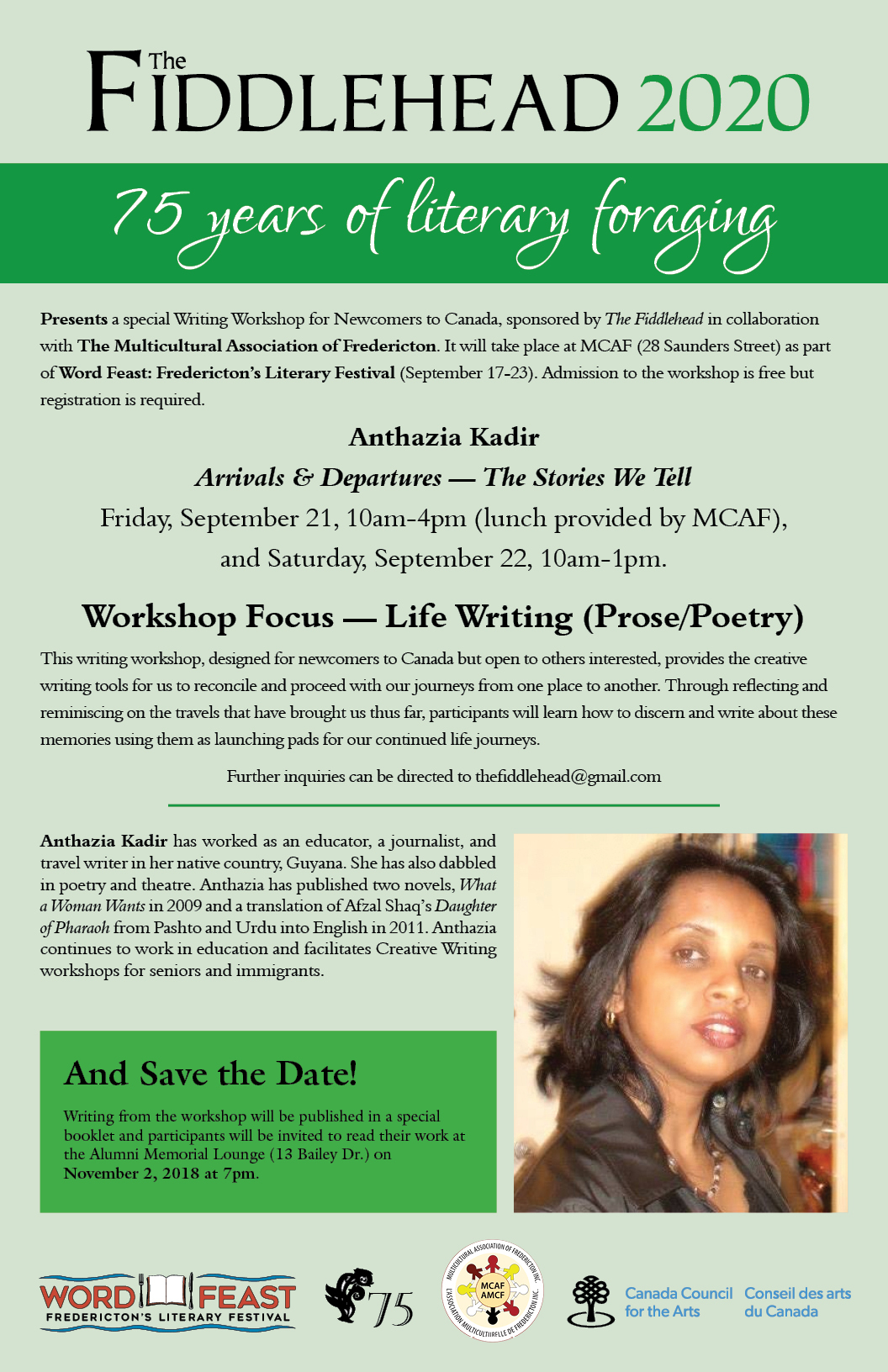
Interview by Emily Skov-Nielsen, Marketing and Promotions for The Fiddlehead. Anthazia Kadir will be giving a Fiddlehead-sponsored workshop "Arrivals & Departures – The Stories We Tell" during Word Feast: Fredericton's Literary Festival. It's a two-day workshop that takes place September 21, from 10am-4pm and September 22 from 10am-1pm. For more information, see the Facebook event or the Word Feast program.
Emily Skov-Nielsen: Firstly, I’m wondering what you hope to accomplish with your workshop “Arrivals & Departures — The Stories We Tell,” and for anyone who might be interested, what should they expect going into it?
Anthazia Kadir: The title of this workshop, "Arrivals and Departures — The Stories We Tell," came to me through conversations I have had with people along my own life journeys. Often we get stuck in a linear way of thinking; often we are caught up in the end of something or waiting for the end of a particular season in our life: “When I move to my new address then I will do this or that.” While this may be right, life is not linear, rather it is ongoing — the end of one season leads into another. Through this workshop I am hoping that participants will come into an inner awareness that departures are not final they just signal a way into something new, something more, and that moments of beginning are not always planned. Through this workshop I am hoping that participants can learn to dance through the uncertainties and the spirals of life, capturing the dance with words on a page. Further, as they learn the craft of writing, participants will have opportunities to gather the reliance that is needed for the difficulties they face each day and also learn to appreciate the beauty that life’s messiness brings.
Emily Skov-Nielsen: Keeping in mind those individuals who are not newcomers to Canada but are still interested in this workshop, how might one approach the theme of "Arrivals & Departures" beyond the context of the immigrant experience?
Anthazia Kadir: "Arrivals and Departures" go beyond leaving one physical place for another, they go beyond airports — hellos and goodbyes. For participants in the workshop, it is about digging deep within ourselves and searching though moments of frustration, anger, pain, and happiness. This is a workshop for anyone who wants to learn how to use writing as a way to document, describe and move through these moments that we might otherwise wish could just disappear. We will learn through various creative writing exercises how to depart from what seems hard to let go of, while keeping the lessons learned. We will learn that departing moments allow us to reflect mindfully with discernment into another chapter within life’s journey.
Emily Skov-Nielsen: When considering your past experiences as a journalist and travel writer in your native country, Guyana, how have they informed your role as an educator?
Anthazia Kadir: During my time writing soft news for a local newspaper I learned, through writing, to appreciate the “ah!” moment that comes with the human experience. Travel writing informed my role as an educator in a soulful kind of a way. I remember the process of writing about villages in the rural countryside of Guyana. I would return after my visits and ponder upon my notes and the pictures I took. I am often guilty of getting caught up in sunsets, or the tides rolling in. What is intriguing about writing is that each day I labour over the words on a page I see something new. I remember always wanting to change my mind about how I described the sunset. The dynamics of writing allow me, in my role as an educator, to listen more, to listen to what is being said and, more importantly, to what is not said in a moment. I listen intentionally to learn something new, rather than quickly reacting, by taking the time to appreciate what is before me whether it is a class of students waiting eagerly for the day to end or working with teachers. We are in a culture of quick fixes and autopilot responses. As an educator who is also a writer, I have learnt over time to be ok with not having all the answers to a situation or a problem. If there is one thing that writing has taught me it is that I do not have to be in control all the time. I have let this awareness of often being in flux, of constantly being in transition, of searching and labouring over the right form of syntax, the right words . . . to flow over into my career as an educator. Structure is important; however teaching is not only technical but more about lives in the constant process of becoming. Often I learn more from my students than they learn from me just as I learn more about how to write about that sunset during the process of writing about it.
Emily Skov-Nielsen: Lastly, since you are offering a life writing workshop, I’m curious to know a little more about your own life journeys and what brought you here to Fredericton?
Anthazia Kadir: When I arrived in Canada in 2007 teaching jobs in Ontario were difficult to find so I decided to return to university and read for a degree in English and Philosophy. While at York University I started to write again and published two novels. After my stint at York I was part of a series of creative writing workshops for seniors in the Mississauga area. While I was blessed to return to writing, I made a promise to myself that wherever teaching takes me I will go. And I kept that promise. I taught in Saskatchewan for two years in an Indigenous community and lived there for 4 years. I often think I am nomadic, always searching. My decision to move to Fredericton happened in the summer of 2016. I came to Fredericton to complete a research course for my M.Ed. and attended the Atlantic Graduate Conference. At the conference I met the late dean of the Faculty of Education, Dr. Ann Sherman. She encouraged me to write a thesis about my experience in Saskatchewan. I followed her advice and presently I am completing that thesis. When my teaching contract ended in Saskatchewan I asked “What now?” Since I had ties to UNB, my family supported the decision to move in 2017. Education, innovation and creativity are themes that ground my life’s work. I feel there is a lot of work yet to be done in Fredericton, in education and immigrant resettlement since that is where my heart, my experience and my training lie. I hope I can find ways to contribute to the process of people rebuilding their lives here. It is with this hope that I think Fredericton will be home for a long time to come.












Add new comment